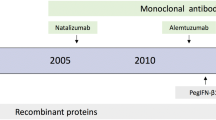Abstract
Biological immunotherapies for multiple sclerosis (MS) include recombinant proteins (preparations of interferon-β) and monoclonal antibodies (e.g. natalizumab, alemtuzumab, ocrelizumab and off-label rituximab). They have shown unprecedented efficacy in the treatment of MS; however, they are all immunogenic and have been associated with immunological complications, such as neutralizing immunogenicity, secondary immunodeficiency and secondary autoimmunity.
Similar content being viewed by others
References
Reich DS, Lucchinetti CF, Calabresi PA. Multiple sclerosis. N Engl J Med. 2018;378(2):169–80.
Soleimani B, Murray K, Hunt D. Established and emerging immunological complications of biological therapeutics in multiple sclerosis. Drug Saf. 2019;42(8):941–56.
Kappos L, Li D, Calabresi PA, et al. Ocrelizumab in relapsing-remitting multiple sclerosis: a phase 2, randomised, placebo-controlled, multicentre trial. Lancet. 2011;378(9805):1779–87.
Hauser SL, Belachew S, Kappos L. Ocrelizumab in primary progressive and relapsing multiple sclerosis. N Engl J Med. 2017;376(17):1694.
Hesse D, Sellebjerg F, Sorensen PS. Absence of MxA induction by interferon β in patients with MS reflects complete loss of bioactivity. Neurology. 2009;73(5):372–7.
Polman CH, Bertolotto A, Deisenhammer F, et al. Recommendations for clinical use of data on neutralising antibodies to interferon-beta therapy in multiple sclerosis. Lancet Neurol. 2010;9(7):740–50.
Farrell RA, Giovannoni G. Measuring and management of anti-interferon beta antibodies in subjects with multiple sclerosis. Mult Scler. 2007;13:567–77.
Kolb-Maurer A, Goebeler M, Maurer M. Cutaneous adverse events associated with interferon-β treatment of multiple sclerosis. Int J Mol Sci. 2015;16(7):14951–60.
Vennegoor A, Rispens T, Strijbis EM, et al. Clinical relevance of serum natalizumab concentration and anti-natalizumab antibodies in multiple sclerosis. Mult Scler. 2013;19(5):593–600.
Clerico M, Artusi CA, Di Liberto A, et al. Long-term safety evaluation of natalizumab for the treatment of multiple sclerosis. Expert Opin Drug Saf. 2017;16(8):963–72.
Antezana A, Sigal S, Herbert J, et al. Natalizumab-induced hepatic injury: a case report and review of literature. Mult Scler Relat Disord. 2015;4(6):495–8.
Ho PR, Koendgen H, Campbell N, et al. Risk of natalizumab-associated progressive multifocal leukoencephalopathy in patients with multiple sclerosis: a retrospective analysis of data from four clinical studies. Lancet Neurol. 2017;16(11):925–33.
Bloomgren G, Richman S, Hotermans C, et al. Risk of natalizumab-associated progressive multifocal leukoencephalopathy. N Engl J Med. 2012;366(20):1870–80.
Alping P, Frisell T, Novakova L, et al. Rituximab versus fingolimod after natalizumab in multiple sclerosis patients. Ann Neurol. 2016;79(6):950–8.
Castela E, Lebrun-Frenay C, Laffon M, et al. Evolution of nevi during treatment with natalizumab: a prospective follow-up of patients treated with natalizumab for multiple sclerosis. Arch Dermatol. 2011;147(1):72–6.
Dahdaleh D, Altmann DM, Malik O, et al. Breathlessness, night sweats, and weight loss on natalizumab. Lancet. 2012;380(9843):726–7.
Bergamaschi R, Montomoli C. Melanoma in multiple sclerosis treated with natalizumab: causal association or coincidence? Mult Scler. 2009;15(12):1532–3.
Dubuisson N, Baker D, Kang AS, et al. Alemtuzumab depletion failure can occur in multiple sclerosis. Immunology. 2018;154(2):253–60.
Moreau T, Coles A, Wing M, et al. Transient increase in symptoms associated with cytokine release in patients with multiple sclerosis. Brain. 1996;119(Pt 1):225–37.
Wing MG, Moreau T, Greenwood J, et al. Mechanism of first-dose cytokine-release syndrome by CAMPATH 1-H: involvement of CD16 (FcγRIII) and CD11a/CD18 (LFA-1) on NK cells. J Clin Invest. 1996;98(12):2819–26.
Wing MG, Waldmann H, Isaacs J, et al. Ex-vivo whole blood cultures for predicting cytokine-release syndrome: dependence on target antigen and antibody isotype. Ther Immunol. 1995;2(4):183–90.
Blasco MR, Ramos A, Malo CG, et al. Acute pneumonitis and pericarditis related to alemtuzumab therapy in relapsing-remitting multiple sclerosis. J Neurol. 2017;264(1):168–9.
Azzopardi L, Thompson SA, Harding KE, et al. Predicting autoimmunity after alemtuzumab treatment of multiple sclerosis. J Neurol Neurosurg Psychiatry. 2014;85(7):795–8.
CAMMS223 Trial Investigators, Coles AJ, Compston DA, et al. Alemtuzumab vs. interferon beta-1a in early multiple sclerosis. N Engl J Med. 2008;359(17):1786–801.
Ocrevus® (ocrelizumab): US prescribing information. South San Francisco: Genentech Inc; 2019.
Dunn N, Juto A, Ryner M, et al. Rituximab in multiple sclerosis: frequency and clinical relevance of anti-drug antibodies. Mult Scler. 2018;24(9):1224–33.
Kadish R, Robertson D, Sweeney M. Fatal leukoencephalopathy in a patient with multiple sclerosis following treatment with ocrelizumab. Neurology. 2018;90(15 Suppl):5.353.
Author information
Authors and Affiliations
Consortia
Ethics declarations
Conflict of interest
The article was adapted from Drug Safety 2019; 42(8):941–56 by employees of Adis International Ltd./Springer Nature, who are responsible for the article content and declare no conflicts of interest.
Funding
The preparation of this review was not supported by any external funding.
Rights and permissions
About this article
Cite this article
Adis Medical Writers. Be aware that the benefits of biological drugs in multiple sclerosis may be offset by their capacity to cause immunological complications. Drugs Ther Perspect 36, 63–66 (2020). https://doi.org/10.1007/s40267-019-00693-x
Published:
Issue Date:
DOI: https://doi.org/10.1007/s40267-019-00693-x



